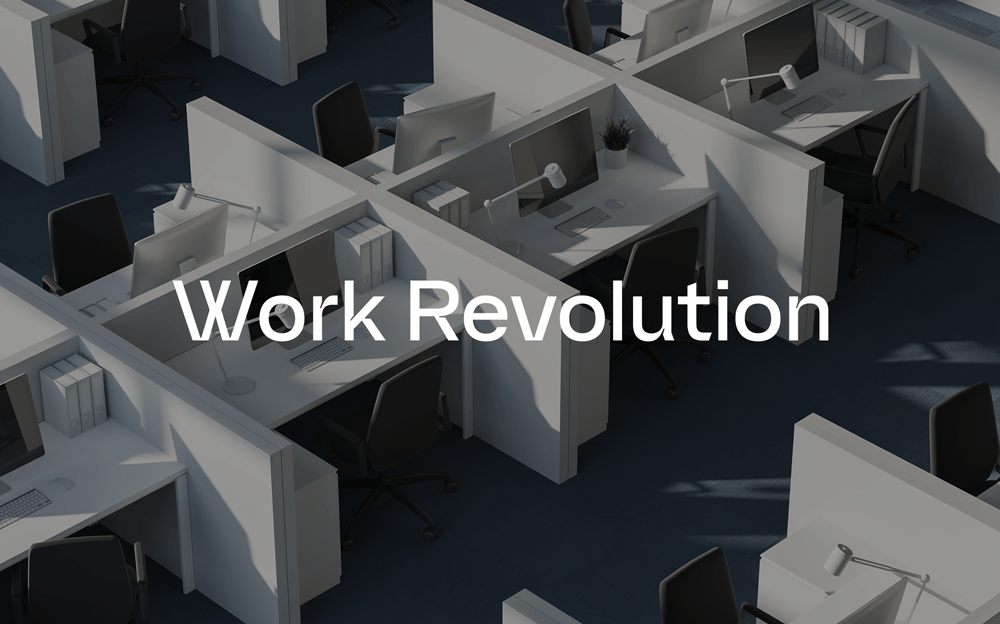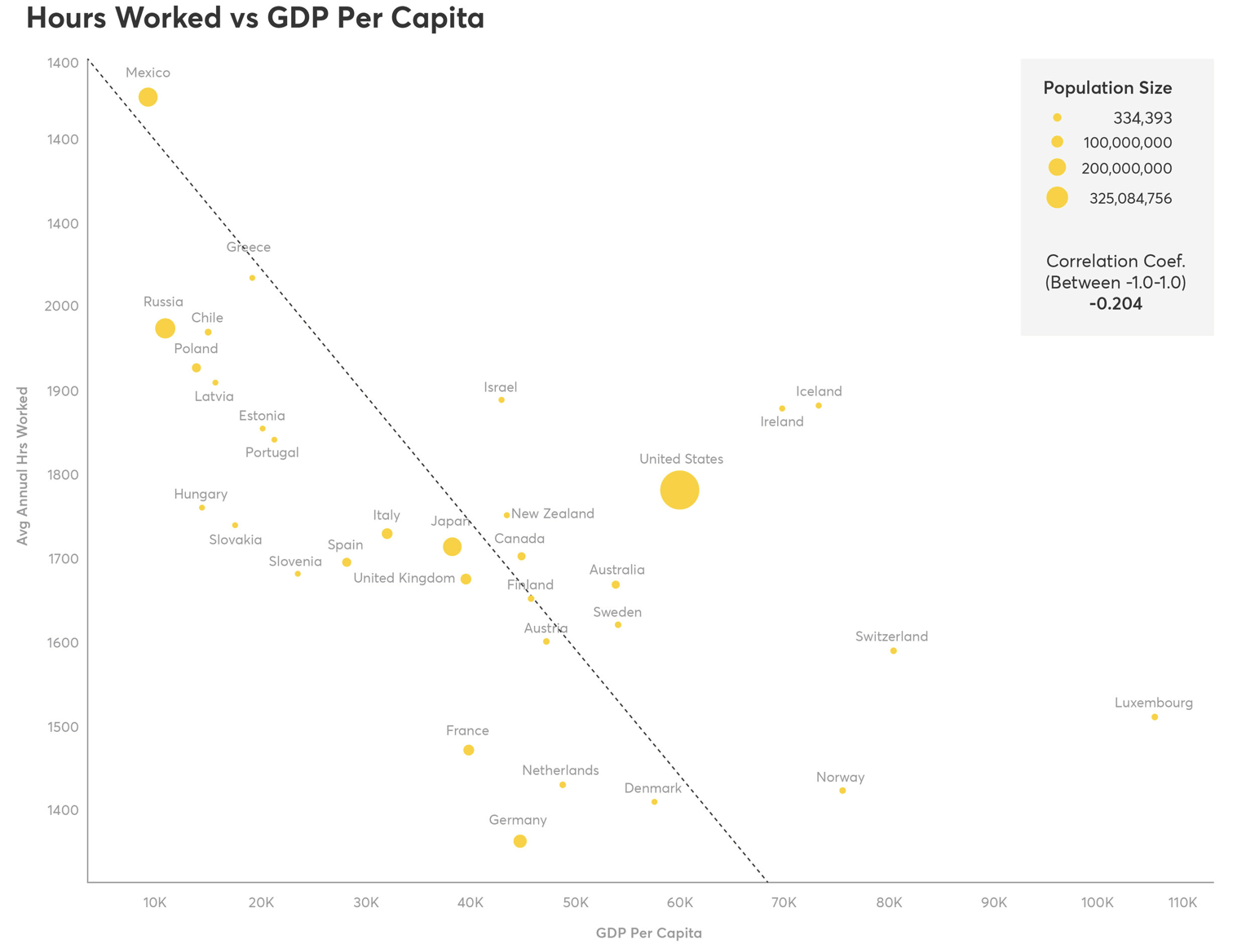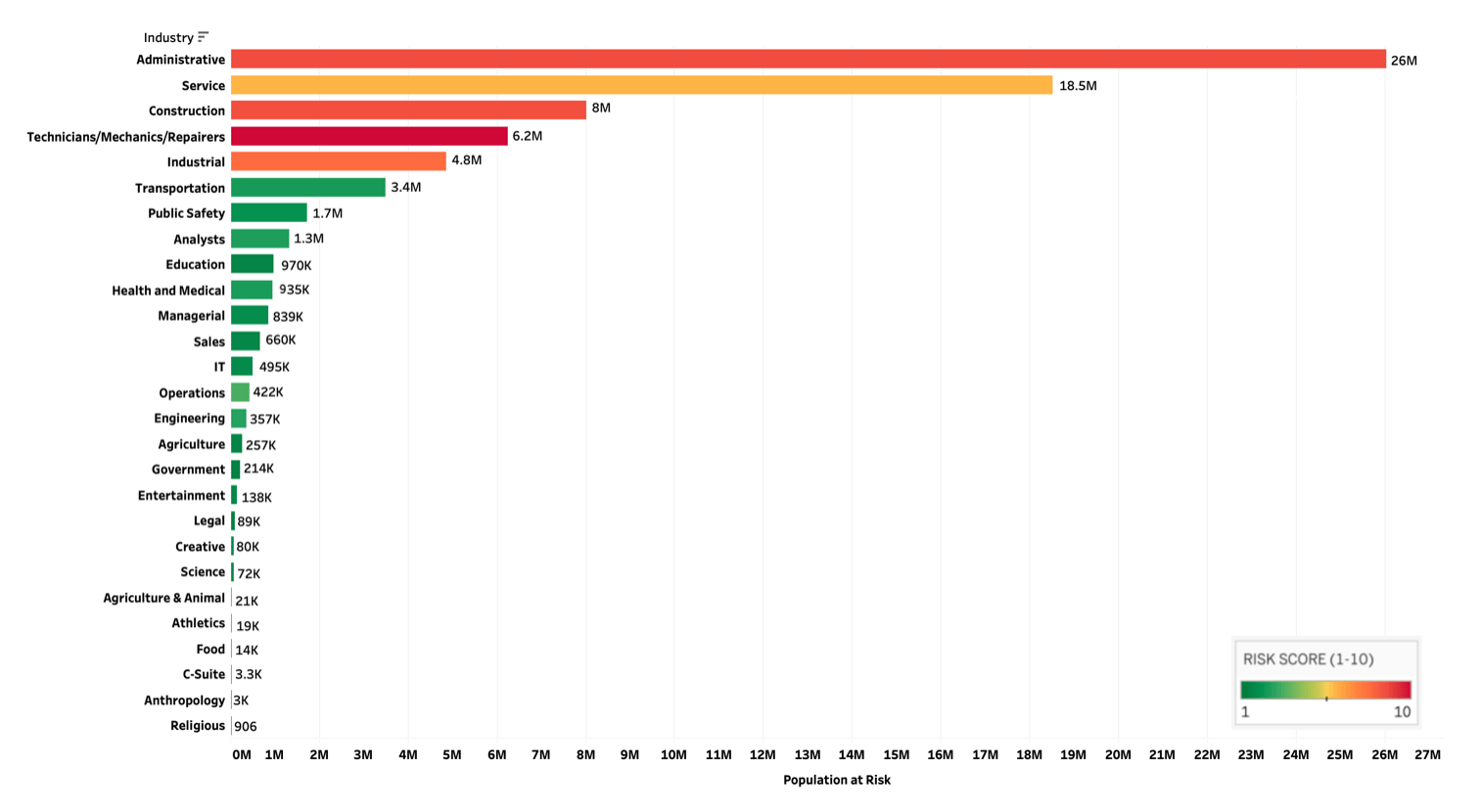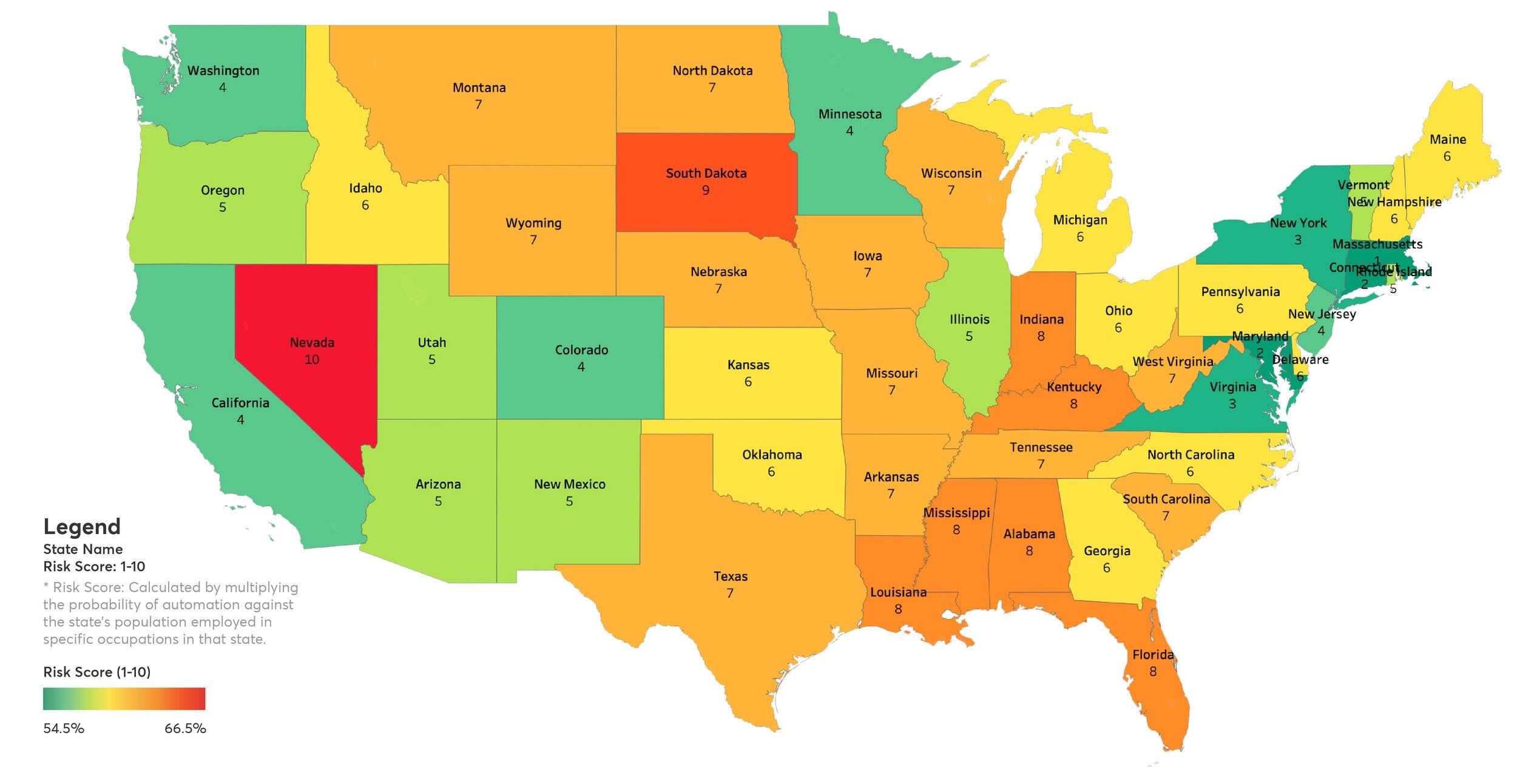
Work Revolution
Welcome to the age of work secularism
Work defined us, but we’re losing our religion.
“All hail, Work” has been the declaration of a decade. A cultural cry driven by “work-ism”— the belief that work isn’t a means to an end, but rather, the end itself. As global businesses claimed lofty brand purposes, they set their sights on employees for evangelists. Work turned faith in a company’s vision for the future and employees, its dutiful disciples.
But as we exit one decade, we look to the next. Say hello to the new Work Secular. People are giving up the desire to self-actualize through the visions of employers. Instead, they’ll actively put work in a box that’s separate from themselves. Work is no longer the higher force that imbues meaning into life; people will look for purpose elsewhere.
So how is this cultural shift—coined Work Secularism by TBWA’s cultural lab, Backslash—challenging the present and paving the way toward the future? And what does it mean for business?
In order to understand, Backslash looks to Work’s past and present. We’ve conducted a global qualitative study, utilizing the global TBWA network for intel and insight. We’ve consulted experts, economists, psychologists, industry leads and individuals in 8 different countries across the globe, who represent the range of both blue-collar and white-collar work.
And in sum, we’ve captured a larger story, told here. From this global investigation, we bring to you three of the biggest shifts in Work, told through documentary, data, and prose.
We’ve created this idea that the meaning of life should be found in work.
— Oren Cass, The Once and Future Worker
If Workism is a means to an end, then the only thing you are is what you do. Faith and fulfillment or vicious malady? You decide.
Workism’s rise was concurrent with work-life balance in wide demand—promised and pedaled by Silicon Valley and start-up culture. Demands for balance were answered with flexibility and perceived control over one’s schedule. But it was the very desire for balance between work and life that put the two in the proverbial blender.
Work culture became clockless. The advent of personal laptops and cellphones bred always-on workstreams. Answering midnight emails became nonchalant and frantic weekend text messages from higher ups, and even clients, became business-as-usual. Those with this always-on attitude sought self-fulfillment and shared success, but instead, found themselves on a hamster wheel to nowhere.
The workplace went sexy and offices transformed into campuses—small cities even, with all the amenities you could ever wish for. Companies like Airbnb, Facebook, and SnapChat were the pinnacle of the “cool company” aesthetic that defined the aspirational workplace. Cubicles were dismantled for bullpens, personal phones were used professionally, beer options were added to the water cooler, catered meals were provided on-site, and co-workers became family stand-ins. Soon, happy hour once spent at a local bar with friends became more of an office ritual.
Famed CEOs became architects of a global idea of “cool” work and made themselves gods. They helped to form two ideas that permeate our current cultural belief: working for a big brand name with a campus and culture is the “cool” job to have, and working independently and on your own terms leads to happiness and freedom. Behemoths that symbolized the Work Revolution, such as WeWork, told applicants not to “just make a living—make a life.”
Control and flexibility became a sort of quid pro quo:
You let us leave early, we’ll work later into the night at home.
You let us leave early on Fridays, we’ll spend our weekends catching up on work.
You give us “unlimited vacation,” we’ll always be an email or a phone call away from solving problems.
But rather than boost morale, this lifestyle became akin to a prison without walls. If everyone is available at all times, where does work end and life begin?
The Church of Work operates in cult-like fashion
Individuals come willing to read its scripture, one that promises purpose and higher meaning in a confused world. It allows one to engineer community through the corporate entity they align themselves with. And as disciples, they’re willing to sacrifice time, energy, and wellness for the sake of something greater. But what is the worker to do when their job and always-on lifestyle doesn’t actually lead to personal fulfillment and self-actualization?
The foundations of the Church of Work have begun to crack. Burnt out, disillusioned, and unstable, individuals find that the current culture is not sustainable.
The Age of Work Secularism is one of reform. It calls for a compromise, one between happy workers and happy business. In uncertain times ahead, businesses will need to lead in change rather than wait for it to be demanded of them. Below, we explore three major pivots that will define this cultural shift for both business and workers.
I. From Blur to Boundaries
Burnout is business’ silent killer. What began as water cooler whispers turned international headlines of the “Burnout Epidemic,” a condition sweeping across the globe and affecting everyone from the fast-food worker to the advertising creative. A 2018 Gallup study found that two in every three workers suffer from the psychological effects of overwork. While workers bear the brunt, they’re not the only ones that feel the effect.
Businesses also suffer, many times unknowingly. The same Gallup report found that burnt-out employees have 37% higher absenteeism, 18% lower productivity, and 15% lower profitability.
Backslash sees a coming shift away from work-life blur. As the sexy “work-life balance” betrayed its name, a new term will soon be in high-demand: boundaries. Work and life will require true separation where not employees, but employers draw a line in the sand. This shift is already starting to take hold.
Like state broke from church, work breaks from life. In Japan, a general pushback against “nominication” culture or compulsory after-work drinks, are creating this separation. At Huffington Post, Ariana Huffington instituted an opt-in policy that deletes work emails during vacation time. Four-day work weeks are being tested by major players like Microsoft and even Shake Shack. And in the Chinese city of Zhuhai, authorities seek to ban WeChat (used for virtually every aspect of life) after work hours to separate work from play.
To lead the way to the Post-Burnout Workplace, business needs to lessen the blend by forcibly implementing boundaries.
Why Implement Boundaries?
They Are Good for Business.
Countries where employees have more time off tend to have higher output per capita.

Source: Organization for Economic Co-Operation and Development (OECD), 2019, looking at all 35 OECD countries.
II. Stable is The New Sexy
In the tech craze and Silicon Valley boom, steady lost its sex appeal to risk. But that’s about to change as jobs in sectors deemed attractive prove increasingly unstable:
Unicorn start-ups like Uber and Lyft continue to contribute to a swelling servant class of on-demand workers but have yet to turn a profit. WeWork’s debacle and drop in valuation puts investment in co-working and flexible work spaces into question. Tech giants like Facebook, Amazon, Alibaba, and Netflix are publicly lambasted as Big Bad Wolf with headlines decrying corporate culture and working conditions alike. CEO-driven cults of personality are revealing their flaws via frenetic tweets a la Elon Musk. And those working at start-ups tire of subpar pay, limited benefits, and a perpetual uncertainty surrounding a timely paycheck.
With disenchantment of start-up culture and unreliability of gig work, a chasm divides expectations from reality.
Now, old sectors are finding new desirability. In France, country-wide campaign “La French Fab,” is rebranding factory work as a stable tech-related career with steady paychecks, concrete work-structure, and strong opportunities for career growth. Harvard Business Review writes “…in the race for innovation and digital transformation, the idea of stability has been somewhat lost in the mix, and there are strong indications that we should revisit its merits.” Businesses take note. The constant state of reinvention that has come to define both industries and the workplace has made the job landscape feel like shaky ground.
According to a 2019 global report on the World’s Most Attractive Employers from Universum, student career aspirations are being influenced by growing economic uncertainty. And new research by the International Federation of Accountants (IFAC) finds that Gen Z is “focused on the economy and their job prospects.” IFAC’s global survey reveals that 89 percent of GenZers look for a profession that “offers a stable career path.” As individuals face reality and economic uncertainty, autonomy and risk-oriented “sense of entrepreneurialism” no longer have the same appeal.
In the Age of Work Secularism, guidance, stability, and structure become new “it” factors.
III. Work and Education Become One System
Over the past decade, Work’s Revolution brought individual promise. DIY strategies have allowed people to circumvent the high cost of higher-ed, and self-discovered and self-honed skills have been applauded. All rules? Thrown out the window.
The “Robolution” is here to rock the boat. What was once a dystopian dream of the future is now reality. From a robot mixologist to A.I paralegals, creative stunts turn testing ground for massive expansion. According to the World Economic Forum, robots will handle 52 percent of current work tasks by 2025. Cost-efficient and less prone to error, the adoption of robots and A.I makes business sense.
Robots will not only displace the blue-collar worker. According to Forbes, 500 million white-collar jobs will be transformed by A.I in just 5 years. Rapid automation will soon streamline the workforce. And it has the potential to displace everyone from the service worker to developers, engineers, managers, and advisors.
Job Automation Risk by Industry

Source: Automation Probability from Carl Frey & Michael Osborn, State level data from the Bureau of Labor Statistics. Risk score calculated based on % of each industry’s population at risk in the US, normalized on a scale from 1–10 – Developed by TBWA Data Lab
Job Automation Risk by State

Source: Automation Probability from Carl Frey & Michael Osborn, State level data from the Bureau of Labor Statistics. Risk score calculated based on % of state’s population at risk, normalized on a scale from 1–10-Developed by TBWA Data Lab
As the Robolution constantly transforms the job market, rules will be called back into place. Education will become a constant touchpoint and frequent reskilling will become a requirement. Since individuals cannot afford to go back to school over and over again, big business will partner with education to mend the market.
A workplace in the Age of Work Secularism will put boundaries between work and personal life but blend the world of work and education. It will call into order an embedded system that works in tandem rather than as a baton toss. A lifelong state of Work-Edu.
As work holds less power over our personal lives, it will go from being a channel to self-actualization to buoy, stepping stone, and guide on an uncertain path.
Work Secularism comes to mend the matters of a decade of Workism. A major cultural shift, it will reshape the way we live, learn, work, and play.
To rehabilitate the health of business and worker, boundaries will replace blur.
To provide stability and guidance in uncertain times, steady will win over risk.
To prepare workers for a new job market, work and education will merge to aid and relax a hyper-culture of DIY and make-it-on-your-own.
This means more time off. No more always-on. Instead, productive when present. Midnight emails will likely become a boogeyman, a specter of the past. Leisure, travel, and transportation industries will boom as employees seek fulfillment from time spent with family, friends, and finding themselves. Communities outside of work will be rebuilt. Instead of a costly milestone, learning will be lifelong.
Priorities will shift forever, and that will be a good thing for businesses everywhere.
Work defined us but we’re losing our religion.
After all, it’s just a job.
Special Report on Work Revolution brought to you by Backslash:
Strategy: Cecelia Girr, Ariel Sayre, Sarah Rabia
Production: Yareli Morales, Pat McGuinness, Jason Lauckner, Chay Lee
Operations: Dana Fors, Alexander Landau, Christian Stein
Additional Contributors:
Matt Segal & Ryan Bautista – TBWA\DataLab
Justine Charenton – Global Story Correspondent, TBWA\Paris
Julien Benattar – Global Story Correspondent, TBWA\Paris
Raul Moreno – Global Story Correspondent, TBWA\Madrid
Yoku Ishida – Global Story Correspondent, TBWA\HAKUHODO
Maako Yokoyama – Global Story Corresponden, TBWA\HAKUHODO
Can Degerli – Global Story Correspondent, TBWA\Istanbul
Huseyin Dogan – Global Story Correspondent, TBWA\Istanbul
Kyra von Mutius – Global Story Correspondent, Heimat Berlin
Claudia Valdivia – Linguist
Lauren Kao – TBWA\Design